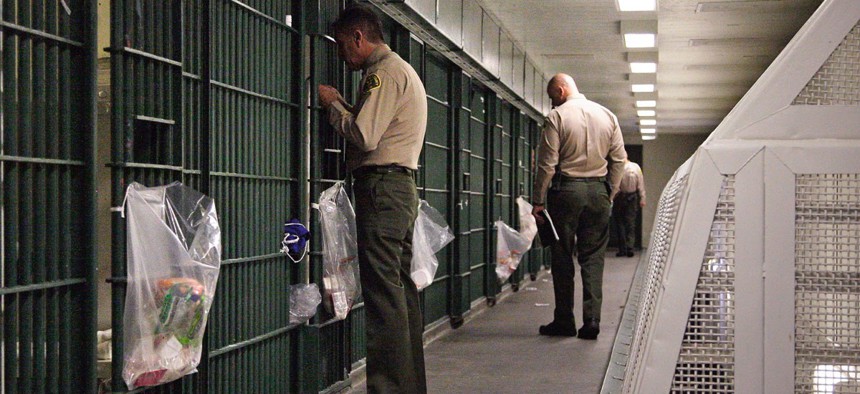8 Counties Advance Plans for Jail Reform

Men's Central Jail in Los Angeles County. Reed Saxon / AP Photo
"Many of the jurisdictions want to reduce reliance on money bail and make decisions about who should be held pretrial,” according to the MacArthur Foundation’s director of justice reform.
Eight counties are implementing two-year plans for jail reform that will end their misuse and overuse, and thereby overincarceration, as part of the MacArthur Foundation Safety and Justice Challenge.
Ada County, Idaho; Cook County, Illinois; Los Angeles County, California; Mecklenburg County, North Carolina; Multnomah County, Oregon; Palm Beach County, Florida; Pennington County, South Dakota; and Shelby County, Tennessee will receive grants ranging from $350,000 to $2 million to improve their criminal justice systems.
Jails see nearly 12 million admissions annually, 20 times the number of prison admissions, and about 70 percent of sentenced offenders and pretrial detainees are incarcerated for nonviolent traffic, property and drug offenses.
“The majority of people in jail are being held pretrial, even though they’re innocent until proven guilty,” Laurie Garduque, the foundation’s director of justice reform, told Route Fifty by phone.
About 70 percent of inmates in fact.
Challenge participants are looking to boost the effective and efficient use of taxpayer dollars to end jails’ use as warehouses for the mentally ill, low-income and people of color. Blacks and Latinos make up 51 percent of the U.S. jail population, despite comprising only about 30 percent of the national population.
Initially, the foundation selected 20 out of 191 challenge applicants to map out their criminal justice systems and provide them with reform targets. Eleven were selected to advance, but the other nine have been offered a chance to refine their strategies.
A number have appointed community advisory boards, working groups or community coordinators to engage the public, like Palm Beach County’s Criminal Justice Commission, which includes state legislators and set up a working group specifically for racial and ethnic disparities. Charleston County established an application process for a new Criminal Justice Coordinating Council and then put some of those members on a policymaking committee.
Multnomah County held a town hall on criminal justice reform, which Garduque called a “good first step.”
“Many of the jurisdictions want to reduce reliance on money bail and make decisions about who should be held pretrial,” she said.
Others are also working to divert people with mental health and substance abuse issues, reflecting a growing concern inmates “churn through the jails,” Garduque said.
Cook County and Palm Beach County are setting up triage centers and screening incoming inmates to filter them into helpful programs and services.
“There will be occasions when you don’t quite get it right,” Garduque said, referring to re-offenses. “These are not failsafe solutions.”
But she hopes leaders remain committed to reform and inspire others to rethink their own justice systems and collaborate with stakeholders.
The biggest problem many jurisdictions face is lacking the infrastructure to look at the data and understand where and why problems arise.
“This is a public system,” Garduque said. “And it should be held publicly accountable.”
Dave Nyczepir is a News Editor at Government Executive’s Route Fifty and is based in Washington, D.C.
NEXT STORY: Mayors Join With Blumenthal to Urge White House to Extend DACA Deadline






